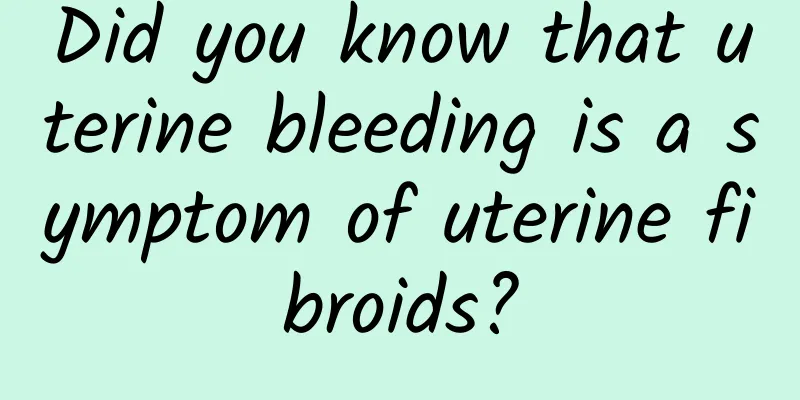Can I still get pregnant with a uterine cyst?

|
Uterine cysts usually do not directly lead to infertility, but the specific situation needs to be evaluated based on the nature, size and location of the cyst. If the cyst is small and has no obvious symptoms, it generally does not affect pregnancy; but if the cyst is large or accompanied by obvious reproductive system abnormalities, it may affect pregnancy, so it is recommended to seek medical attention in time. Uterine cysts are usually divided into simple cysts and complex cysts. Simple cysts are generally harmless. Functional ovarian cysts, for example, will disappear with the menstrual cycle and will not affect pregnancy. However, if it is an endometrial cyst, chocolate cyst or other pathological cyst, it may interfere with the conception process and even increase the risk of ectopic pregnancy and miscarriage. Women with uterine cysts may experience symptoms such as irregular menstruation, dysmenorrhea or pelvic pain, and require detailed examination to clarify the type and severity of the cyst. General diagnostic methods include ultrasound examination, blood marker (such as CA125) test, etc., and surgical exploration is required if necessary. There are currently various methods for treating uterine cysts, such as drug regulation of hormone levels (such as oral contraceptives), minimally invasive surgery (such as hysteroscopy) or traditional surgical treatment (such as cyst removal). The specific plan needs to be determined according to the doctor's advice. Uterine cysts are usually divided into simple cysts and complex cysts. Simple cysts are generally harmless. Functional ovarian cysts, for example, will disappear with the menstrual cycle and will not affect pregnancy. However, if it is an endometrial cyst, chocolate cyst or other pathological cyst, it may interfere with the conception process and even increase the risk of ectopic pregnancy and miscarriage. Women with uterine cysts may experience symptoms such as irregular menstruation, dysmenorrhea or pelvic pain, and require detailed examination to clarify the type and severity of the cyst. General diagnostic methods include ultrasound examination, blood marker (such as CA125) test, etc., and surgical exploration is required if necessary. There are currently various methods for treating uterine cysts, such as drug regulation of hormone levels (such as oral contraceptives), minimally invasive surgery (such as hysteroscopy) or traditional surgical treatment (such as cyst removal). The specific plan needs to be determined according to the doctor's advice. If you are planning to get pregnant but have a history of uterine cysts, it is recommended that you undergo a comprehensive gynecological evaluation before trying to conceive. During the treatment or management of cysts, you should maintain a healthy lifestyle and avoid excessive fatigue and stress. Promote physical recovery through dietary conditioning, such as increasing the intake of foods rich in high-quality protein and vitamins (such as dark green vegetables, fish, etc.); insist on proper exercise to regulate endocrine function and maintain an optimistic attitude. If the symptoms disappear after the treatment and the reproductive function is normal, the chance of pregnancy is higher. In the event of abnormal secretions, severe abdominal pain or unexplained bleeding, you should seek medical attention as soon as possible to ensure the health and safety of the mother and fetus. |
<<: Irregular menstruation and sudden bleeding in urine
>>: Symptoms of spontaneous abortion due to cervical pregnancy
Recommend
Diagnostic approach to acute pelvic peritonitis
Acute pelvic peritonitis is a gynecological disea...
Make good use of your beauty time! Small exercises have amazing effects
In our busy daily lives, it is extremely difficul...
Precautions after medical abortion
Medical abortion is an abortion performed by taki...
How is pelvic inflammatory disease treated surgically?
Surgery for pelvic inflammatory disease is genera...
How to care for endometriosis
Some women don't know about endometriosis, an...
What are the main causes of cervical erosion? Summarize the 4 causes of cervical erosion
Cervical erosion is a common gynecological diseas...
What are the symptoms of chronic vaginitis
The occurrence of vaginitis not only affects the ...
Experts help you diagnose pelvic inflammatory disease
Pelvic inflammatory disease is also a common dise...
How to completely cure bacterial vaginosis
In daily life, we should pay attention to bacteri...
The correct way to prevent cervicitis
I believe that everyone should be familiar with g...
How should we eat breakfast to increase satiety and delay gastric emptying? Nutritionist teaches you how to eat high-protein breakfast
Are you also a busy office worker who has to eat ...
Can I get pregnant due to right ovarian cyst? What are the symptoms?
Can I not get pregnant with a right ovarian cyst?...
What should I do if my menstrual period is not very regular and is delayed every time?
What should I do if my menstrual period is not ve...
What is the cause of dysmenorrhea in women?
Dysmenorrhea is not unfamiliar to every woman who...
Can I do IVF with adenomyosis? What is the cause of adenomyosis?
Nowadays, adenomyosis has become a very common gy...









